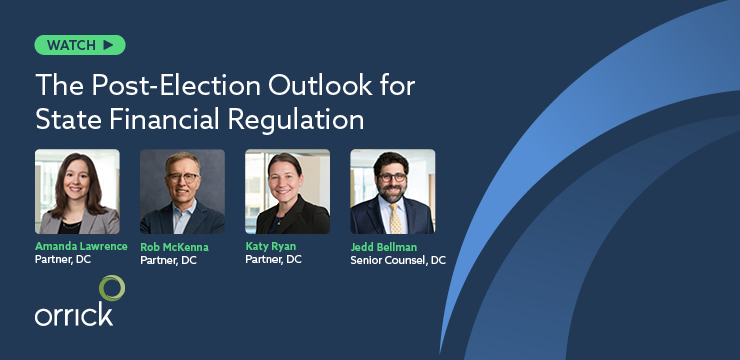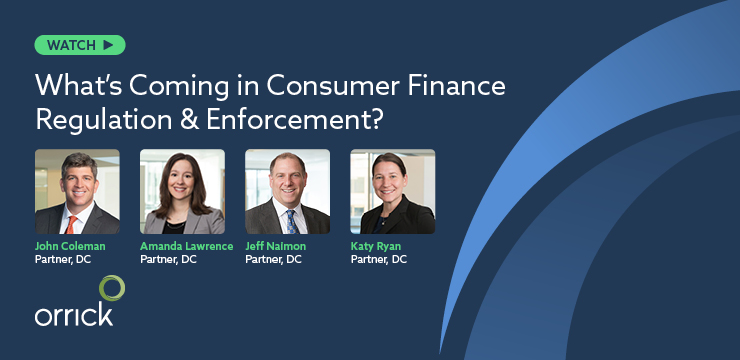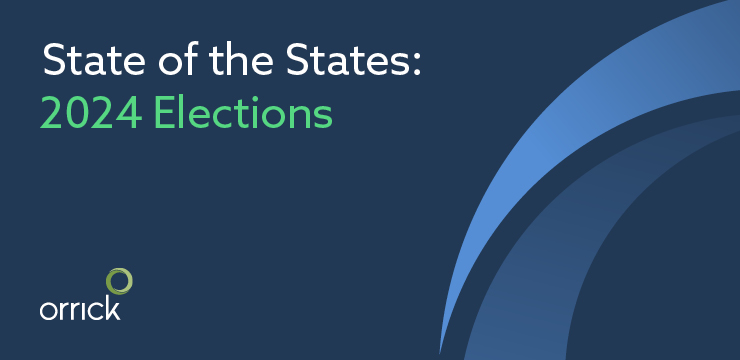The Post-Election Outlook for State Financial Regulation
1 hour watch | December.03.2024
As seen during the first Trump administration, some state financial regulators and attorneys general are likely to become more strident in response to a perceived retrenchment at the federal level. Join Team Orrick for a conversation about anticipated regulatory, enforcement and policy-making priorities at the state level. We discuss:
- Which states are expected to be the most aggressive under the Trump Administration?
- What new tools, interpretations and coordination strategies are states likely to utilize?
- How can financial services companies prepare to navigate multi-state enforcement actions and examinations?
- What are the implications for financial services deal-making, bank partnerships and investors?
Key Takeaways
1. There is a strong possibility attorneys general and regulators in both blue and red states will be more aggressive in a second Trump administration.
We expect Democratic-led states to once again be very active in investigating and enforcing consumer protection laws, particularly around issues like redlining and UDAAP violations.
Republican-led states will likely focus on partisan priorities like "woke capitalism" and perceived discrimination against industries such as firearms, even if they adopt a more populist approach on consumer protection issues than traditional GOP administrations.
2. States can leverage new tools, statutory interpretations and coordination strategies.
Since the last Trump administration, many states have passed laws and regulations — both in the legislature and through financial services agency regulations — that make it easier to bring investigations and find violations, including those related to corporate governance, cybersecurity and data privacy.
States can also expand their oversight and enforcement capabilities through a robust infrastructure for multi-state coordination. Multi-state investigations were traditionally limited to mortgage-related issues but have expanded to include money transmission, consumer credit and debt collection.
Another trend at the state attorneys general level is the increased use of contingency fee arrangements with private plaintiffs' firms, allowing states to supplement their resources and bring more cases.
3. State regulation has implications for bank partnerships and deal-making in the fintech space.
Banks are increasingly focused on vendor management, leading to closer scrutiny of licensing and regulatory compliance as they evaluate potential partner relationships.
Fintech companies that pursue aggressive, unlicensed business models may face increased resistance from potential bank partners. They also may face resistance from investors factoring in heightened state regulatory and enforcement risk when evaluating financial services companies.
4. Companies can proactively prepare for regulatory and investigative scrutiny.
Building constructive relationships with attorneys general, state financial regulators and their staff establishes credibility. It also familiarizes them with your company and its business model before any potential enforcement action or examination.
Many examiners consider well-structured policies, procedures and corporate governance frameworks to be table stakes, so it makes good sense to update these regularly. That can help a company avoid issues and respond to coordinated information requests and examinations from multiple state agencies.


